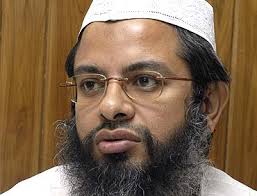 Mahmood A. Madani a politician from Rashtriya Lok Dal party is a Member of the Parliament of India representing Uttar Pradesh in the Rajya Sabha, the upper house of the Indian Parliament. He belongs to a respected Sayyid family.
Mahmood A. Madani a politician from Rashtriya Lok Dal party is a Member of the Parliament of India representing Uttar Pradesh in the Rajya Sabha, the upper house of the Indian Parliament. He belongs to a respected Sayyid family.
Family
Maulana Mahmood Madani represents the third generation legacy of struggle for freedom, equality, social justice and human rights. His grand father, Maulana Syed Hussain Ahmad Madani, the great Scholar of Islamic theology, a teacher of Prophet’s tradition in Prophet’s Mosque at Medina, and in Darul Uloom Deoband, devoted his life to the struggle for freedom. His son, Maulana As’ad Madani followed in his father’s footstep.
Early Life
Born on 3 March 1964 at Delhi, young Mahmood named after the spiritual mentor of his grand father, Maulana Mahmood Hasan Deobandi, a freedom stalwart, Islamic Scholar and founder member of Jamiat Ulema-e-Hind, learnt Quran by heart and acquired basic education in Islamic theology at Amroha, Uttar Pradesh. Later, he entered Darul Uloom Deoband and graduated from there in 1992. In his final year at Deoband, the incident of demolition of Babri Mosque at Ayodhya occurred which affected him. The demolition was followed by communal riots spreading all over India including the town of Deoband, Muslims were massacred, curfew was imposed. Food and essentials became scarce. Mahmood Madani came out to the aid and relief of victims. He also laid a siege with large number of supporter around the local police and administration offices and forced them to bow down to his demands for immediate justice. This was the first occasion when his natural acumen for leadership, valiance and zeal and fervor for fighting for the weak and oppressed were seen and acknowledged publicly and people started looking at him with expectation as the torch bearer of his distinguished family’s lofty traditions.
Later Life
After graduation from Darul Uloom Deoband in 1992 he took to business for fulfillment of his economic needs but this didn’t deter him from devoting full time and energy to social and political activities. He started his political career by joining Samajwadi Party of which he soon became All India National Secretary and central council member. He was elected to Rajya Sabha form U.P in March 2006 and at present he is a sitting member.
Acknowledging his social and political activities, Saharanpur district unit of Jamiat Ulama-i-Hind, elected him as president. Soon after, he was elevated to the office of Secretary of U.P. State Jamiat Ulama-i-Hind and later as its vice-President. In the year 1997, there was urgent need for secretary organization in the Centre.
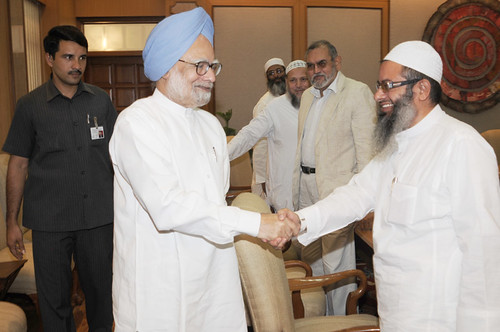




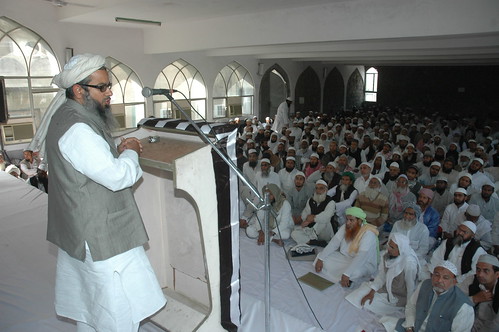
Anti-terrorism activity
Madani launched anti-terrorist campaign throughout the country. He has been instrumental in getting Fatwa passed by Deoband Clergy. Besides organizing about 40 anti terrorism conferences all over the country the massive public gatherings in May 2008 at Ramlila Ground of Delhi, in November 2008 at Hyderabad and in February 2009 at Mumbai have helped in mobilizing Muslim masses and Ulema against terrorism.
Other activities
During the Gujarat earthquake, his relief and rehabilitation work brought him national recognition and he was elected as General Secretary of Jamiat Ulema-e-Hind from 2001 to 2008. He is now an executive member and regarded as its leader. His far-reaching recent achievement is in launching the countrywide anti-terrorist campaign and in getting the Deoband Clergy to pass a fatwa against terrorists. He organised 40 anti-terrorism conferences all over the country. The massive public gatherings in May 2008 at the Ramlila Grounds of Delhi and in November 2008 in Hyderabad have helped in mobilizing the Muslim masses and Ulema against terrorism. He came into further prominence following his pointed remarks to Pakistan's ex-president, Parvez Musharraf, during a meet organized in India.
Source : Wikipedia
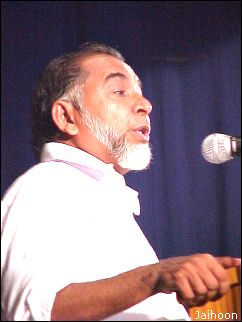 Sheikh Mohammed Karakunnu (Malayalam:ശൈഖ് മുഹമ്മദ് കാരകുന്ന്) is a prominent Islamic scholar and author from Kerala, India. He is the Assistant Amir of Jamaat-e-Islami Hind, Kerala chapter. He authored more than sixty books and has delivered numerous speeches on Islam, Muslim and Jamat-e-islami.He served as Director of Islamic Publishing House, Kerala.
Sheikh Mohammed Karakunnu (Malayalam:ശൈഖ് മുഹമ്മദ് കാരകുന്ന്) is a prominent Islamic scholar and author from Kerala, India. He is the Assistant Amir of Jamaat-e-Islami Hind, Kerala chapter. He authored more than sixty books and has delivered numerous speeches on Islam, Muslim and Jamat-e-islami.He served as Director of Islamic Publishing House, Kerala.
Biography
Sheikh Mohammed was born to Mohammed Haji and Fatima on 1950 July 15 at Karakkunnu, a village near Manjeri in malappuram district, kerala. He completed his education from Farooq Raudathul Uloom Arabic College, Kozhikode. He worked as a teacher in various government High schools. Later he took voluntary retirement and fully concentrated in writing and speeches for Islamic Dawah and propagation. He was executive member of Jamat-e-islami Hind and its kerala chapter. He is married to Amina. Aneez Mohammed, Dr. Aleef Mohammed, Dr. Basima, Ayman Mohammed are their children. He served as Director of Islamic Publishing House, Kerala.


Author
Sheikh Mohammed Karakunnu has authored 47 Islamic books and translated another 14. He is an active participant in various stages of symposiums on Islam and inter-religious dialogue and debate. The widely accepted book, Quran Lalitha saram (simple meaning of Quran) is co-authored by Sheikh Mohammed and Vanidas Elayvoor. He received number of awards in recognition of his works. Some of his books are:
- Mathathinte Maanushikha Mukham ( Humane Face Of Religion)
- Dhaivam Matham,Vedham-sneha Samwadam ( Dialogues on God, Creed and Scriptures)
- Lokanugrahi ( Muhammed:Supreme Mentor Of Humanity)
- Vaivahika Jeevitham Islamika Veekshanathil ( Married life in Islamic view)



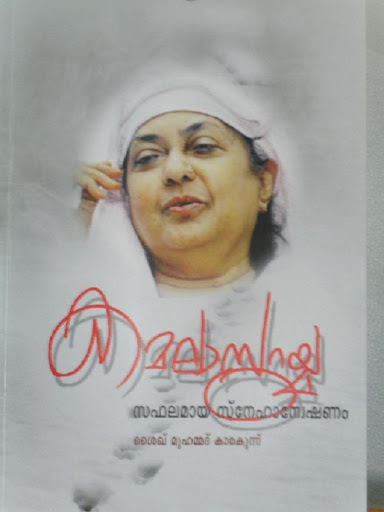 He also directed the project for releasing an electronic edition in Malayalam of Tafheemul Qur’an, the popular commentary of the Qur'an in six volumes by Abul Ala Maududi.
He also directed the project for releasing an electronic edition in Malayalam of Tafheemul Qur’an, the popular commentary of the Qur'an in six volumes by Abul Ala Maududi.
Source : Wikipedia

| Birth name | Akhtaribai Faizabadi |
|---|
| Born | October 7, 1914(1914-10-07) |
|---|
| Origin | Faizabad, Uttar Pradesh, India |
|---|
| Died | October 30, 1974(1974-10-30) (aged 60) |
|---|
| Genres | Ghazal, Thumri, Dadra |
|---|
| Occupations | Musician |
|---|
| Years active | 1929–1974 |
|---|
Akhtari Bai Faizabadi or Begum Akhtar (October 7, 1914–1974) was an Indian vocalist of Ghazal, Dadra and Thumri.
Her first public performance was at the age of fifteen. She also acted in several Bollywood films, including Mumtaz Beghum (1934), Jawaani Ka Nasha(1935), King for a Day (1933, director : Raaj Hans). She received the Sangeet Natak Akademi Award for vocal music, and was awarded Padma Shri and Padma Bhushan (posthumously) by Govt. of India Today her name is almost synonymous with the concept of ghazal gayaki, and her imitable style of singing which immortalized her, and gave her the title of Mallika-e-Ghazal (Queen of Ghazals).
Early life
Begum Akhtar was born in Bada Darwaza, Town Bhadarsa, Bharatkund, Faizabad District, Uttar Pradesh. Her father Asghar Hussain, a young lawyer who fell in love with her mother Mushtari and made her his second wife, subsequently disowned her and his twin daughters Zohra and Bibbi (Akhtar).


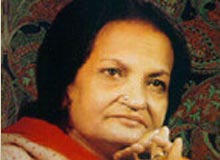
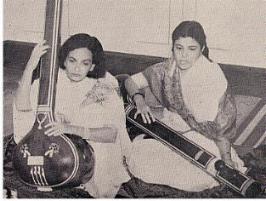


Career
Akhtar was barely seven when she was captivated by the music of Chandra Bai, an artist attached to a touring theatre group. However at her uncle's insistence she was sent to train under Ustad Imdad Khan, the great sarangi exponent from Patna, and later under Ata Mohammed Khan of Patiala. Later, she travelled to Calcutta with her mother and learnt music from classical stalwarts like Mohammad Khan, Abdul Waheed Khan of Lahore, and finally she became the disciple of Ustad Jhande Khan.
Her first public performance was at the age of fifteen. The famous poetess, Sarojini Naidu, appreciated her singing during a concert which was organised in the aid of victims of a Bihar earthquake of 1934. This encouraged her to continue singing ghazals with more enthusiasm. She cut her first disc for the Megaphone Record Company, at that time. A number of gramophone records were released carrying her ghazals, dadras, thumris, etc.
Begum Akhtar's good looks and sensitive voice made her an ideal candidate for a film career in her early years. When she heard great musicians like Gauhar Jan and Malak Jan, however, she decided to forsake the glamour of the film world for a career in Indian classical music. Her supreme artistry in light classical music had its moorings in the tradition of pure classicism. She chose her repertoire in primarily classical modes: a variety of raags, ranging from simple to complex. After the advent of talkie era in India, Beghum Akhtar acted in a few Hindi movies in thirties. East India Film Company of Calcutta approached her to act in "King for a Day" (alias Ek Din Ka Badshah) and Nal Damayanti in 1933.
Like others of that era, she sang her songs herself in all her films. She continued acting in the following years. Subsequently Beghum Akhtar moved back to Lucknow where she was approached by the famous producer-director Mehboob Khan, as a result of which she acted in "Roti" which was released in 1942 and whose music was composed by maestro Anil Biswas. "Roti" contained six of her ghazals but unfortunately due to some trouble between producer and director, Mehboob Khan subsequently deleted 3-4 ghazals from the film. All the ghazals are available on Megaphone gramophone records. Beghum Akhtar, meanwhile, left Bombay and returned to Lucknow.
In 1945, Akhtaribai married a barrister, Ishtiaq Ahmed Abbasi, and became known as Begum Akhtar. However, after marriage, due to her husband's restrictions, she could not sing for almost five years and subsequently, she fell ill, that is when her return to music was prescribed as a befitting remedy, and in 1949 she returned to the recording studios. She sang three ghazals and a dadra at Lucknow Radio Station. She wept afterwards and returned to singing in concerts, a practice that lasted until her death.
Her voice matured with time, adding richness and depth. She sang ghazals and other light classical pieces, singing them in her inimitable style. She has nearly four hundred songs to her credit. She was a regular performer on All India Radio. She usually composed her own ghazals and most of her compositions were raag based.
Death
During her last concert in Ahmedabad she raised the pitch of her voice as she felt that her singing had not been as good as she had wanted it to be and she felt unwell. The additional demand and stress that she put herself under resulted in her falling ill and was rushed to the hospital.
She died on October 30, 1974 in the arms of Nilam Gamadia, her friend, who invited her to Ahmedabad, which has become her final performance.
Discography
Bollywood career
- Kalyug Hai Jabse Aaya Maya Ne...
- Roti | Anna Sahab Mainkar
- Wo Hans Rahe Hain Aah Kiye Jaa...
- Ulajh Gaye Nayanwa Chhute Nahin...
- Char Dino Ki Jawani Matwale...
- Ai Prem Teri Balihari Ho...
- Phir Fasle Bahaar Aayi Hai...
- Rehne Laga Hai Dil Me Andhera...
- Hamen Yaad Teri Sataane Lagi...
- Main Raja Ko Apne Rijha Ke Rahungi...
- Ishq Mujhe Aur Kuchh To Yaad Nahi...
- (1954 - hame.n dil me.n basaa bhi lo).
Filmography
- Mumtaz Beghum(1934)
- Jawaani Ka Nasha(1935)
- King for a Day (1933, director : Raaj Hans)
- Ameena (1934, director : -)
- Roop Kumari (1934, director : Madan)
- Naseeb Ka Chakkar (1936, director : Pesi Karani)
- AnaarBala (1940, director : A M Khan)
- Roti (1942, director : Maadhav Kaale)
- Jalsaghar (1958; director: Satyajit Ray)
Awards and recognition
- 1968: Padma Shri
- 1972: Sangeet Natak Akademi Awar
- 1975: Padma Bhushan (posthumously)
Source : Wikipedia



































